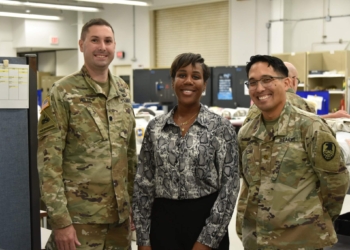Some of the most important work Elizabeth Graham has ever done was unpaid. As an elementary teacher with volunteer stints in Haiti and Guatemala, the 29-year-old Texas educator knew she had plenty to offer employers: international teaching experience, cross-cultural leadership skills and a demonstrated drive to help children.
Just one small hiccup: how to get that across to a potential boss with just one short section of a resume.
“[My volunteer work] is job-related, so it only makes me a more well-rounded candidate,” Graham said. “Honestly, who cares if you get paid for the work? You just need to show you can do it well.”
But how? Undoubtedly, volunteer work is something at which many military spouses excel. But some might struggle with how to get that volunteer work from the real world to the printed resume.
What kind of volunteering are we talking about? How much might a boss want to know? Is it even helpful to include?
As the careers manager for Blue Star Families based in San Diego, Laura Torres hears these questions frequently. The good news: including volunteer experience on one’s resume is not only doable and helpful, but might actually boost one’s hiring chances.
“An employer wants to see the skills they’re looking for [on a resume], and including volunteer experience is a great way to highlight your specific areas of expertise,” Torres said.
“Plus, it’s helpful in hiding the gaps” in employment that transient military spouses often accumulate, she added.
But, Torres cautions that there are ways to get it wrong. The number one error to avoid: highlighting volunteer work that has nothing to do with the job you’re aiming for.
“So, if I’m applying for an Information Technology [IT] desk support position, sorting clothes for a shelter doesn’t apply to IT,” she explained. “My employer doesn’t want to see that stuff — unless I sorted the clothes through a computer system and applied techniques within the field of IT.”
In other words, people need to focus on skills that cater to both their volunteer position and the potential job. In Graham’s case, that meant showcasing all the flexibility and innovation — two attributes any school principal looks for — required while volunteering overseas.

“I think employers are interested in seeing that you have well-rounded skills and are involved with organizations beyond your nine to five,” Graham said.
To that end, employers may not want to know about every aspect of your volunteer activities. If you helped with a politician’s election campaign, for example, wonderful! But Torres points out that your future boss may be of the opposite political party and therefore develop a hidden bias against you. It’s far better, she advises, to feature the skills you demonstrated during the campaign than whether your candidate won.
“You want to highlight your outreach: how many members you could grow or reach, how successful you were in fundraising,” she said. “So use terms that are nonpolitical, non-biased and that focus on the achievements. Highlight the growth and success as a result of your volunteerism,” remembering to concentrate on skills that are applicable to the job you’re applying for.
There are multiple ways to do so. A traditional resume includes volunteer work after paid positions in chronological order. But more modern resumes emphasize skills first, then both volunteer experiences and paid positions to “prove” those skills.
In Graham’s resume, for instance, she lists skills and leadership attributes like “Dedication” and “Team Player” in the left column, then multiple positions, both paid and not, where she demonstrated those qualities in the right column.
A few hard-and-fast rules, according to Torres: don’t use military acronyms unless shooting for an on-base position. Don’t spell out every single duty of a volunteer experience — just the parts that intersect with the hoped-for role. And research the company beforehand, zeroing in on the area of social justice they’re interested in — the environment, literacy, military support, etc. — so the candidate’s experience in that field is shown.
Most importantly, as a military spouse used to playing “second fiddle,” Torres advised to not sell oneself short.
“When you don’t give yourself enough credit [on a resume], you’re cheating yourself out of a great opportunity for your career,” she said.
Read comments






































